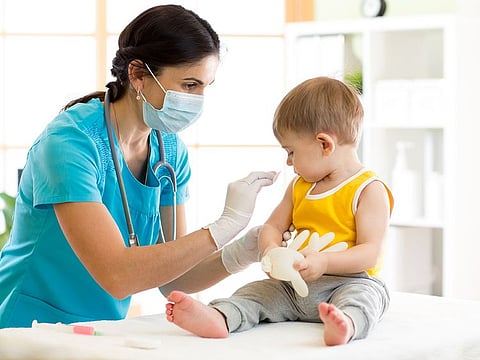Give your child a shot at a healthy, happy life with vaccinations
Vaccines ensure your little ones are protected from infectious diseases for life

As parents, you’d do everything in your power to stack the odds in favour of your child having a great life – they receive the best education you can afford, the choicest of toys and gadgets and nourishing food; whatever guarantees them a happy, healthy adulthood.
What will actually secure them a shot at that fairy-tale future are, well, shots – scheduled vaccinations.
Every year, paediatric vaccinations prevent more than 2.5 million deaths among children aged five and younger. You aren’t nervous about your baby contracting small pox because life-saving vaccines successfully eradicated it.
While their effects are incredible, the mechanics of vaccines are simple, explains Dr Amr El Zawahry, Specialist Paediatrician at Al Zahra Hospital Dubai.
“Vaccines work by preparing the body to fight illness. Each [vaccine] contains either a dead or a weakened germ (or parts of it) that causes a particular disease.
Vaccines are safe. Any licensed vaccine is rigorously tested across multiple phases of trials before it is approved for use, and regularly reassessed once it is on the market.

“The body practises fighting the disease by making antibodies that recognise specific parts of that germ. So when someone is exposed to the actual disease, the antibodies are already in place and the body knows to combat it and the person doesn't get sick. This is called immunity.”
The idea of introducing dead or deactivated viruses and germs into your child’s body can set off alarm bells, but Dr Al Zawahry reassures.
“Vaccines are safe. Any licensed vaccine is rigorously tested across multiple phases of trials before it is approved for use, and regularly reassessed once it is on the market.”
Routine vaccinations
A quick glance at a standard immunisation card will show a long list of vaccines, assigned to a child’s different developmental stages. With infants, some have to be administered within 24 hours of birth. At other times, multiple jabs are administered together. Won’t a little baby’s body be overwhelmed by many different vaccines?
Dr Al Zawahry allays those doubts: “Children are exposed to hundreds of germs every day. In fact, a common cold or sore throat will burden your child’s immune system more than vaccines.”
In fact, Dr Al Zawahry lists how the benefits of vaccinating outweigh side effects.
“Polio can cause paralysis; measles triggers brain swelling and blindness; and tetanus causes painful muscle contractions making eating and breathing difficult, especially for newborns. An unvaccinated child risks disability and even death.”
Side effects are almost always mild and restricted to redness, swelling and soreness at the injection site, occasionally accompanied by low-grade fever. However, these are treatable and go away within a few days. “Doctors and clinic staff are trained to deal with serious allergic reactions, which are rare exceptions and only occur with terminal illnesses like cancer or they’ve had a severe allergic reaction to previous vaccine dose.”
Even without these exceptions you might want to postpone your child’s vaccination – sometimes, it’s an important meeting, at other times the keening cries of your child as the needle pierces skin can trigger protective instincts to delay their inoculation and subsequent pain. It is the greatest disservice, cautions Dr Al Zawahry.
“Children under the age of five haven’t built up necessary defences to fight infection.
“The recommended schedule provides infants immunity early in life, before they’re exposed to life-threatening diseases. Delaying a vaccine, increases your child’s susceptibility.”
Optional vaccines
Some expats might have missed vaccines while juggling the switch from their home country’s immunisations schedule to the UAE's. Just talk to your healthcare worker and catch up on the dose and cover common diseases of the home country, says Dr Al Zawahry.
“For example, the meningococcal vaccine is optional in the UAE but mandatory in Africa where meningitis is endemic. So those who have travelled in from high-risk countries or will be travelling to a crowded event, such as Hajj, should prioritise this vaccination for their babies. The two doses are administered at nine and 12 months of age.”
Medical benefits aside, vaccines also carry social advantages – optimum rates of immunisation guarantee herd immunity (when the large portion of a community is immune to a disease).
Without vaccines, diseases such as pertussis (whooping cough), polio and measles that have declined will remerge as hygiene and sanitation can’t curb communal spread.
It is why up-to-date vaccinations are mandatory to enrol children in school.
But what about the disadvantages? Especially ones involving disconcerting claims of mercury compound called thimerosal in vaccines and the MMR (measles-mumps-rubella) vaccine inducing autism in children, you might ask.
Dr Al Zawahry quashes those myths: “Numerous scientific research and studies, both old and ongoing, have concluded that the MMR vaccine and thimerosal aren’t linked to autism.”
Suffice to say, completing your child’s scheduled immunisations is tantamount to swaddling them in an invisible cloak of protection and care; it is a tangible expression of the fierce protectiveness and love you feel for your kid. Because while the magical future you dream for them is imagined, good health and immunity is very real and accessible, through vaccinations.
This content comes from Reach by Gulf News, which is the branded content team of GN Media.